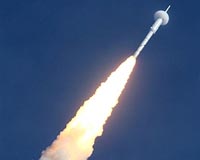 |
Washington (AFP) Feb 1, 2010 President Barack Obama has ditched US plans to return to the moon and hitched NASA's future to private industry in a budget calling for the space agency to stay close to Earth and research. In a 2011 budget blueprint for the US space agency unveiled on Monday, Obama proposed dropping the massively over-budget Constellation program former president George W. Bush implemented to develop a new-generation rocket aimed at returning Americans to the moon by 2020. The White House said it wanted to ground Constellation because it was too costly, used outdated technology, and would not be ready to ferry humans to the moon before 2028. In its place, "a bold and ambitious new space initiative that invests in American ingenuity to propel us on a new journey of innovation and discovery" was being launched. The president called for spending six billion dollars over five years for NASA to develop commercial spacecraft that could carry astronauts into low Earth orbit. That was a far smaller increase than the three billion a year a president-appointed panel has said would be necessary for a viable human flight program. "The United States and its partners in other nations, in industry and in academia will pursue a more sustainable and affordable approach to spaceflight through the development of transformative technologies and systems," NASA Administrator Charlie Bolden told reporters. "We will blaze a new trail of discovery and development. We will facilitate the growth of new commercial industries. And we will expand our understanding of the Earth, our solar system and the universe beyond." Private industry will take on the role of building the space vehicles that take humans to the International Space Station (ISS), while NASA focuses on research and development -- a proposal that has critics raising safety concerns. Jim Bell, president of The Planetary Society, a global public space advocacy group, said there was nothing new in the private sector's involvement in building spacecraft or other vehicles for the government. "Every government uses the private sector to build fighter aircraft," Bell told AFP, noting that the lunar lander in the Apollo program that landed humans on the moon for the first time in 1969 was built by a commercial contractor. "The difference here is the magnitude of change: from the rocket to the nose cone, they're calling for major commercial development," said Bell, who backs the NASA plans and pledged to pressure Congress to approve them. Under the plans, use of the ISS would be extended to 2020 or beyond to "keep a commitment to our international partners and develop the full potential of this amazing orbiting laboratory," said Bolden. High-tech jobs would be created and the United States would go "further, faster and more affordably into space," he added. But Congress has to approve the budget proposals and some lawmakers have railed at plans to axe Constellation. Senator Richard Shelby, the top Republican on a committee that oversees funding for NASA, said the proposal to ditch the grandiose Bush-era plan had set US manned space flight on a "death march." But Jeff Greason, chief executive of XCOR Aerospace and a member of the president-appointed Augustine Commission, dismissed Shelby's attack as "over-the-top and not correct." "What's going on there is a grieving process of admitting that the Constellation plan doesn't now and never did have the budgetary backing to be completed," Greason said, calling it a "truly unfortunate state of affairs" not created by the budget blueprint. NASA officials insisted that canceling Constellation did not spell an end for US ambitions to return to the moon, but would pave the way to go even further into space. "The moon continues to be an important destination for humans along with near-Earth asteroids, and ultimately our destination is the moons and surface of Mars," said NASA deputy administrator Laurie Garver. "We're not canceling our ambitions to explore space, we're canceling Constellation." Obama's NASA plans sees NASA receiving 19 billion dollars in 2011, around 300 million more than the 2010 budget, with small annual increases to follow. Buzz Aldrin, the second man to walk on the moon in 1969, said where Constellation was stuck in the past, Obama's plan was forward-looking. "We've already been to the moon -- some 40 years ago," he said in a statement. "A near-term focus on lowering the cost of access to space and on developing key, cutting-edge technologies to take us further, faster, is just what our nation needs to maintain its position as the leader in space exploration."
Share This Article With Planet Earth
Related Links Mars News and Information at MarsDaily.com Lunar Dreams and more
 Obama to propose abandoning US return to Moon: report
Obama to propose abandoning US return to Moon: reportWashington (AFP) Jan 29, 2010 President Barack Obama's 2011 budget, to be submitted to Congress Monday, will propose abandoning a program to return US astronauts to the Moon, two Florida newspapers said Thursday. Citing administration and NASA officials who spoke on the condition of anonymity, the reports said the White House would call on the US space agency to focus on other programs, including the development of comme ... read more |
|
| The content herein, unless otherwise known to be public domain, are Copyright 1995-2009 - SpaceDaily. AFP and UPI Wire Stories are copyright Agence France-Presse and United Press International. ESA Portal Reports are copyright European Space Agency. All NASA sourced material is public domain. Additional copyrights may apply in whole or part to other bona fide parties. Advertising does not imply endorsement,agreement or approval of any opinions, statements or information provided by SpaceDaily on any Web page published or hosted by SpaceDaily. Privacy Statement |